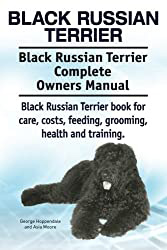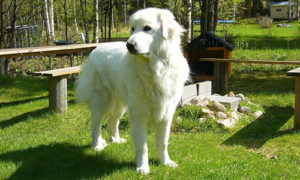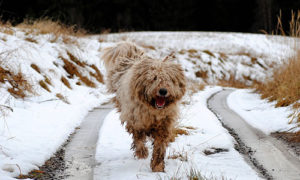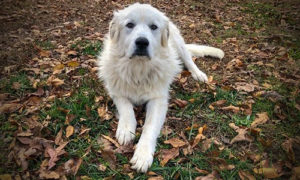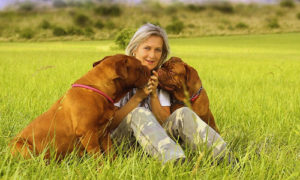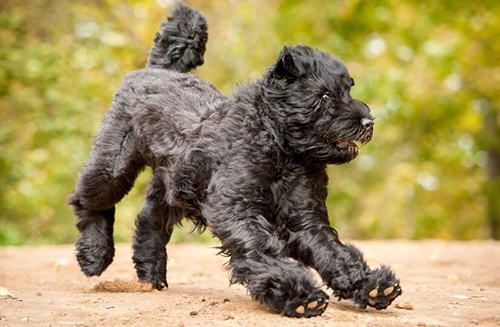
Breeders created the Black Russian Terrier after World War II in Russia as an all-purpose, hardy, trainable military and police dog that could withstand the Russian climate. They created the breed at the state-operated Red Star Kennel in Moscow, and seventeen breeds contributed to the dog’s ancestry, including the Giant Schnauzer, Airedale Terrier, Rottweiler, and Newfoundland.
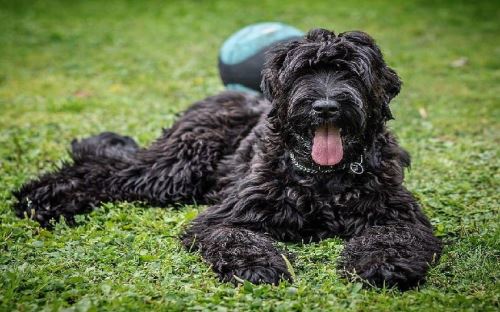
Private breeders started to breed the Black Russian Terrier in 1956, which launched an official standard in 1958. The dog gradually gained a following in Eastern Europe and made its way to America in the 1980s.
The dog is a large-boned, muscular breed with slightly rectangular proportions and a high-set tail that may be long or docked. This dog is a self-assured, powerful dog that moves with a firm, ground covering gait. The breed’s head emphasizes the overall impression of power and strength.
It has a full skull and broad muzzle, further accentuated by the mustache and beard; the large, black nose; and medium-sized, high-set, triangular ears.
Black Russian Terrier Breed Facts
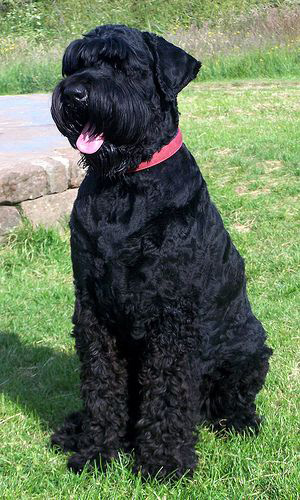
Activity level: This is a breed that needs two half-hour long exercise sessions daily. They enjoy walking, hiking, jogging, swimming, interactive play, and dog sports. These dogs are not very tolerant of heat or exercise in hot weather.
- POPULARITY: Uncommon
- FAMILY: Schnauzer
- AREA OF ORIGIN: Soviet Union
- DATE OF ORIGIN: 1950s
- ORIGINAL FUNCTION: Military
- TODAY’S FUNCTION: Personal protection, search, and rescue
- OTHER NAME: Chornyi, Terrier Noir Russem, Russian Black Terrier, Schwarzer Russicher Terrier, Tchiorny, Svart Terrier, Mustaterrieri
Black Russian Terrier Temperament
Breeder’s selectively bred the Black Russian Terrier for intelligence and trainability. This dog is alert and confident. They’re a loving, devoted, fearless, and determined family dog as well as watchdog.
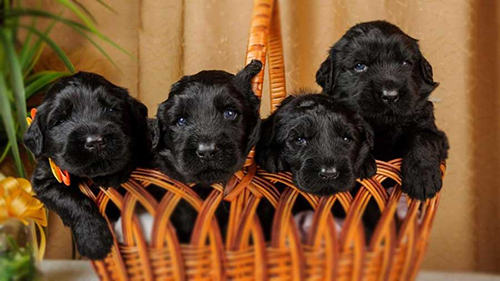
As this is a large, powerful breed, ongoing training and socialization are essential. The breed’s strong guardian instincts begin to emerge during adolescence and become more pronounced by maturity. Without guidance, this trait can result in an overly protective dog.
This dog must have plenty of attention and human companionship. They’re not always reliable with other dogs, and they need supervision when around young children.
Grooming
Brush and comb this dog thoroughly once a week; trimming or professional grooming every four to eight weeks, depending on coat length, is recommended. A grooming DVD is available from the parent club website.
Coat: Slightly wavy double coat from 1 ½ – 6 inches in length with longer facial furnishings.
Color: Black
Health Issues
- Main concerns: CHD, elbow dysplasia
- Minor concerns: hyperuricosuria (HU)
- Occasionally seen: PRA, JLPP
- Suggested tests: hip, elbow, eye, cardiac, HU, (JLPP)
- Life span: 10-11 years
- Weight: 80-145 pounds
- Height: male: 27-30 inches; female: 26-29 inches
Black Russian Terrier Buyer’s Guide and Breeder Advice
This breed is not for inexperienced owners. Purchase only from a breeder who has done health clearances on his or her dogs. Prepare yourself for a dog that will snore, track in dirt, and require crating when guests or repairers come into your home. Join the BRTCA to learn more about the breed.
Parent club: Black Russian Terrier Club of America; founded in 1997
Rescue: Black Russian Terrier Rescue

